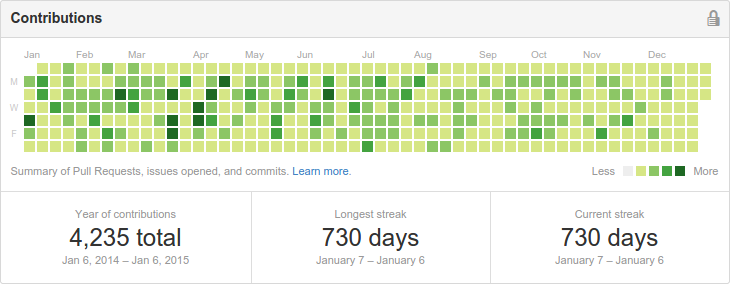I don’t consider myself very devoted to my work, but I’ve been writing code every day for two years. It’s become a deeply-ingrained habit. So much so that it would take effort to stop rather than continue.

Similarly, some people have television habits. It would take them effort to stop watching TV rather than continue doing so. Nobody asks, “Aren’t you worried about getting burnt out from watching so much TV?” Yet it’s not uncommon for me to hear the equivalent when it comes to code. To my ears, both questions sound equally silly.
Speaking of which…
I sometimes wonder if burnout is the western version of fan death. When you think about it, burnout makes little sense. People get depressed and tired from… what, exactly? Working too much? Working too hard? Excessive drudgery? Bull. We are working less than ever before. Just over a century ago, the average work week exceeded 60 hours. Today, it’s 33.[1] Past occupations also involved toil and danger far greater than any employment today. Yet burnout is a modern phenomenon. Strange, eh?
Another argument against burnout comes from biology. The brain is not a muscle. Stress and sleep deprivation can take a toll, but no amount of thinking can hurt it.[2] And burnout is not universal, even in cultures where it is well-known and accepted. There are people who simply don’t burn out. You may not have noticed them when they were your coworkers, but they certainly exist. They’re not superhuman; many of them seem quite normal. There is no equivalent population when it comes to constraints such as sleep, food, or physical exertion. Everyone succumbs to biology eventually.
I’m not saying those who claim to be burnt-out are faking. I don’t doubt that burnout describes a real phenomenon. What I do doubt is the accepted cause (work) and the accepted cure (time off from work). It seems much more likely that burnout is a form of depression[3], which has a myriad of causes and cures.
It is only after making all this noise about burnout that I feel comfortable suggesting the following: Don’t worry about working too much. The important thing is to avoid depression. People more knowledgable than I have written on that subject, but to sum up their advice: Get out. Exercise. Try to form healthy habits. And stay the hell away from negative media such as cable news and Tumblr.
-
See Wikipedia’s article on working time.
-
In fact, thinking is practically all we do while awake. Only with dedication and practice can one reduce the constant stream of thoughts impinging upon consciousness. Even if you only count deliberate thought, people seem to have no trouble spending all day deeply focused on a video game.
-
Is burnout separable from depression in cluster analysis? A longitudinal study, by Renzo Bianchi, Irvin Sam Schonfeld, & Eric Laurent.